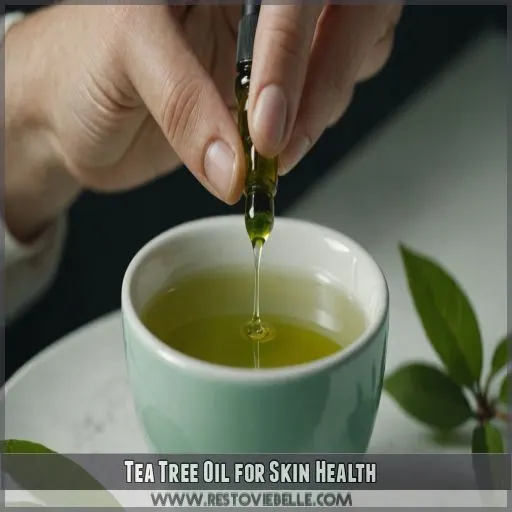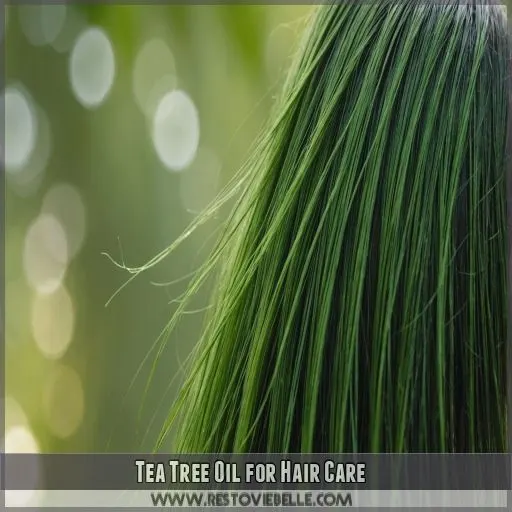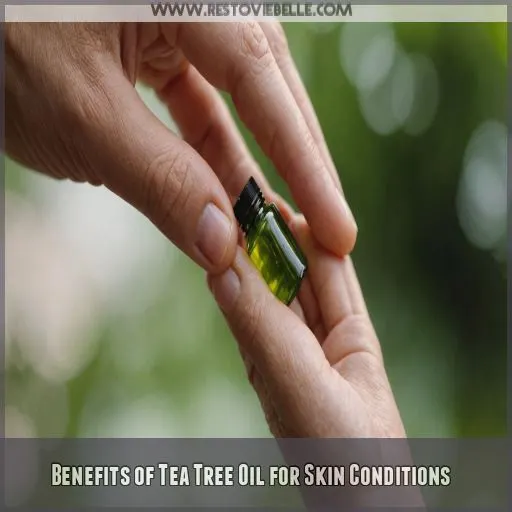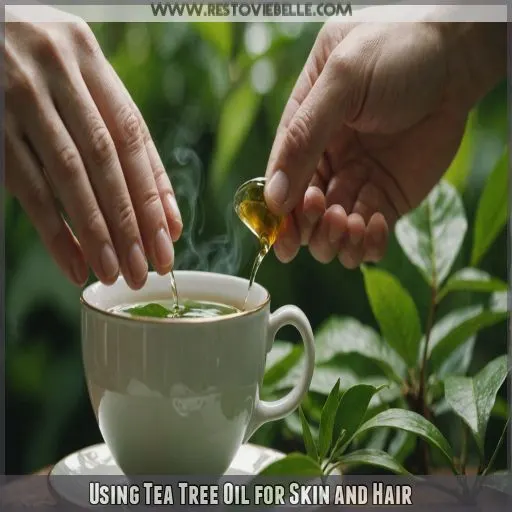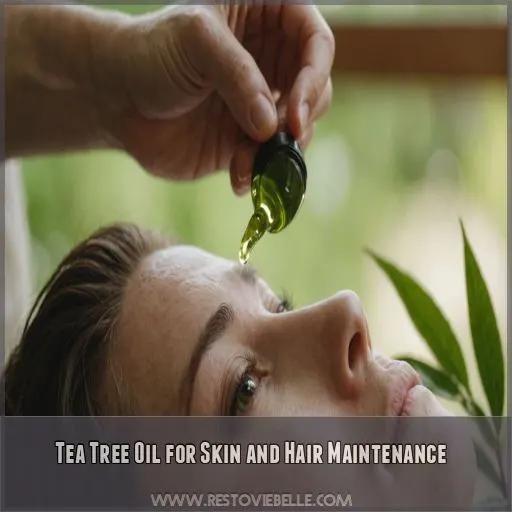This site is supported by our readers. We may earn a commission, at no cost to you, if you purchase through links.
 Tea Tree Oil is a powerhouse when it comes to benefits for skin and hair.
Tea Tree Oil is a powerhouse when it comes to benefits for skin and hair.
This natural wonder can help kick acne to the curb, soothe itchy skin, and even tackle pesky fungal infections.
For your locks, it’s a dandruff-fighting superhero that can promote healthy hair growth.
But hold your horses, don’t go slathering it on straight from the bottle!
Always dilute this potent oil to avoid any skin surprises.
From calming angry red spots to keeping your scalp happy, tea tree oil is like a Swiss Army knife for your beauty routine.
Ready to learn more about this botanical marvel? Let’s explore the benefits of tea tree oil!
Table Of Contents
- Key Takeaways
- Tea Tree Oil for Skin Health
- Tea Tree Oil for Hair Care
- Benefits of Tea Tree Oil for Skin Conditions
- Using Tea Tree Oil for Skin and Hair
- Tea Tree Oil for Skin and Hair Maintenance
- Frequently Asked Questions (FAQs)
- Is tea tree oil good for hair or skin?
- Can tea tree oil be applied directly to skin?
- Can I apply tea tree oil directly on hair?
- Does tea tree oil remove dark spots?
- Can tea tree oil help with psoriasis?
- Is tea tree oil safe for use during pregnancy?
- How long does tea tree oil last before expiring?
- Can tea tree oil be used on color-treated hair?
- Does tea tree oil interact with any medications?
- Conclusion
Key Takeaways
- You’ve got a natural powerhouse in your hands with tea tree oil. It’s like a Swiss Army knife for your skin and hair, tackling everything from acne to dandruff. Just remember, a little goes a long way – you’re not seasoning a salad here!
- Don’t go slathering this stuff on straight from the bottle. Always dilute tea tree oil with a carrier oil before use. Think of it as giving your skin a buffer zone – you wouldn’t want to send your troops into battle without armor, would you?
- From soothing your angry, red spots to keeping your scalp happy, tea tree oil’s got your back. It’s not just for humans either – it can even help keep those pesky bugs at bay. Talk about a multitasker!
- While tea tree oil is nature’s wonder child, it’s not for everyone. If you’re pregnant or have sensitive skin, chat with your doctor before jumping on the tea tree bandwagon. Better safe than sorry, right?
Tea Tree Oil for Skin Health
Dealing with acne, itchiness, and inflammation is a common struggle for many people who are interested in skincare. But what if you could use nature’s power to tackle these skin problems?
Acne Treatment and Prevention
Tea tree oil is a natural Acne Treatment that can help reduce acne severity. Mix it with a carrier oil to create a DIY cleanser and apply it to your skin as a mask. Look for products that contain tea tree oil and follow a consistent acne routine. The antibacterial properties of tea tree oil help combat acne-causing bacteria.
Wound Healing and Infection Prevention
As you work on healing a wound, tea tree oil’s antibacterial properties can be a powerful ally in preventing infection. When applied topically, it can help reduce inflammation and promote a healthy environment for wound healing. In fact, studies have shown that tea tree oil can be effective in treating athlete’s foot, a common fungal infection.
Soothing Itchy Skin and Reducing Inflammation
When itchy skin has you scratching your head, tea tree oil can be a soothing solution. Its natural antihistamines and anti-inflammatory properties can calm irritated skin, reducing inflammation and itching. Mix a few drops with a carrier oil and apply topically to ease eczema relief, seborrheic dermatitis, and other skin irritations.
Natural Remedy for Contact Dermatitis
Contact dermatitis is a common skin condition that can be triggered by various factors, including allergies, irritants, and even certain fabrics.
You’re not alone in dealing with this condition.
As a natural remedy, tea tree oil can help soothe itchy skin and reduce inflammation.
Mix a few drops with a carrier oil and apply topically, but always do a patch test to make sure you’re not allergic.
Reducing Dandruff and Promoting Healthy Scalp
Tired of that itchy scalp and those pesky flakes?
Tea tree oil can be your new best friend!
It has antifungal and antibacterial properties that can soothe your scalp and prevent infection.
You can mix a few drops with your shampoo or use a tea tree oil shampoo to reduce dandruff and promote a healthy scalp.
Say goodbye to flakes and hello to a healthy, happy scalp!
Tea Tree Oil for Hair Care
You’ve heard about tea tree oil’s benefits for skin, but did you know it’s also a hair care powerhouse? From tackling dandruff to promoting healthy growth, this versatile essential oil might be the secret weapon your locks have been waiting for.
Natural Remedy for Dandruff and Itchy Scalp
Got an itchy scalp that’s driving you crazy?
Tea tree oil might be your new best friend.
This natural powerhouse can zap those pesky dandruff-causing fungi and soothe your irritated scalp.
Just add a few drops to your shampoo or mix with a carrier oil for a DIY scalp treatment.
Promoting Healthy Hair Growth and Reducing Split Ends
Want luscious locks? Tea tree oil might be your hair’s new best friend. This natural wonder can boost hair growth and tackle those pesky split ends. Here’s how it works:
- Stimulates hair follicles
- Unclogs pores on the scalp
- Balances oil production
- Strengthens hair shafts
- Reduces breakage
Mix a few drops with your shampoo or try a DIY hair mask. Remember, a healthy scalp is the foundation for fabulous hair. Just don’t go overboard – your hair’s not a salad!
Treating Lice and Nits With Tea Tree Oil
Battling pesky lice? Tea tree oil might be your new secret weapon. This natural remedy packs a punch against those unwanted guests in your hair. Let’s break down how you can use it:
| Method | Instructions | Frequency |
|---|---|---|
| Shampoo | Add 5-10 drops to regular shampoo | Daily |
| Spray | Mix 20 drops with water in spray bottle | 2-3 times/week |
| Direct | Apply diluted oil to scalp with cotton ball | Once weekly |
Soothing Irritated Scalp and Reducing Inflammation
Tea tree oil isn’t just a lice-buster; it’s a scalp soother too! If you’re battling an irritated, inflamed scalp, this natural wonder might be your new best friend. Here’s how it can help:
- Calms itchy, red scalps
- Reduces dandruff-causing yeast
- Fights off scalp-unfriendly bacteria
- Promotes a healthier scalp environment
Mix a few drops with your favorite carrier oil and massage it in. Your scalp will thank you for this DIY treatment that’s as soothing as a cool breeze on a hot day!
Benefits of Tea Tree Oil for Skin Conditions
Tea tree oil isn’t just for acne – it’s a versatile remedy for various skin conditions. From fading scars to soothing eczema, this natural wonder can tackle a range of pesky skin issues you might be dealing with.
Reducing Acne Scars and Hyper-Pigmentation
Tea tree oil isn’t just for active breakouts – it can help with the aftermath too.
If you’re battling acne scars or dark spots, this natural wonder might be your new best friend.
Its anti-inflammatory properties can calm redness, while its ability to promote cell turnover may help fade those pesky marks.
Think of it as nature’s eraser, gently buffing away the reminders of past skin woes.
Natural Remedy for Eczema and Psoriasis
While tea tree oil can help with acne scars, it’s also a potential game-changer for eczema and psoriasis sufferers. This natural powerhouse may offer relief from these pesky skin conditions. Here’s how it can help:
- Reduces inflammation and redness
- Fights off bacteria that can worsen symptoms
- Moisturizes dry, flaky skin
- Promotes faster healing of irritated areas
Soothing Sunburn and Reducing Inflammation
Tea tree oil is known for its benefits for eczema and psoriasis.
It can also be a lifesaver for sunburns.
You know that feeling when your skin is on fire after a day at the beach?
Tea tree oil’s cooling properties can soothe that angry, red skin.
It’s like nature’s own after-sun care, reducing inflammation.
Just remember, a little goes a long way!
Treating Fungal Infections With Tea Tree Oil
Tea tree oil is your secret weapon against pesky fungal infections.
Whether it’s athlete’s foot making you dance an awkward jig or nail fungus cramping your style, this natural powerhouse has got your back.
Its antifungal properties can help knock out infections, leaving you feeling fresh and confident.
Just remember, while tea tree oil is a champ, it’s always wise to consult your doctor for persistent issues.
Using Tea Tree Oil for Skin and Hair
Tea tree oil is a versatile natural remedy that can work wonders for your skin and hair, but it’s important to use it correctly. In this section, we’ll guide you through the proper techniques for applying tea tree oil, help you choose the right product, and highlight some key precautions to keep in mind.
Diluting Tea Tree Oil for Sensitive Skin
Tea tree oil is powerful, but it’s not for everyone.
If you have sensitive skin, don’t worry! You can still use tea tree oil, but you need to dilute it.
Think of it like making a cocktail: too strong, and you’ll regret it.
Start with a 1% dilution (that’s about 1 drop of tea tree oil per teaspoon of carrier oil).
You can adjust the dilution as needed.
Applying Tea Tree Oil to Skin and Hair
Ready to harness the power of tea tree oil?
Here’s the scoop on applying it to your skin and hair.
Always dilute it with a carrier oil – think of it as giving your tea tree oil a buddy to play nice with your skin.
For your face, mix a drop or two with your moisturizer.
For hair, add a few drops to your shampoo or conditioner.
Easy peasy!
Precautions and Potential Side Effects
Now that you know how to apply tea tree oil, let’s talk safety. While it’s a natural powerhouse, it’s not without risks. Here are four key precautions to keep in mind:
- Patch test first – your skin might throw a fit!
- Dilute, dilute, dilute – don’t go full strength, or you’ll regret it.
- Keep it external – swallowing this stuff is a big no-no.
- Pregnant? Consult your doc before jumping on the tea tree bandwagon.
Tips for Choosing the Right Tea Tree Oil
| Factor | What to Look For |
|---|---|
| Purity | 100% pure, no additives |
| Concentration | 10-40% for skin/hair use |
| Brand | Reputable, transparent sourcing |
| Reviews | Positive feedback from users |
Tea Tree Oil for Skin and Hair Maintenance
Discover how tea tree oil can revolutionize your daily skincare and hair care routines. From natural deodorant to insect repellent, this versatile oil offers a range of benefits to keep you looking and feeling your best.
Incorporating Tea Tree Oil Into Daily Skincare Routine
Ready to harness the power of tea tree oil in your daily skincare routine? It’s easier than you think! This versatile oil can be your skin’s new best friend. Here’s how to incorporate it:
- Mix a few drops into your face wash for a gentle, antibacterial cleanse
- Create a DIY serum by adding it to your favorite carrier oil
- Use as a spot treatment for pesky blemishes
- Add to your moisturizer for an extra boost of protection
Using Tea Tree Oil as a Natural Deodorant
Tired of harsh chemicals in your deodorant?
Tea tree oil is a natural antibacterial that can help fight odor-causing bacteria, keeping you fresh all day.
Mix a few drops of tea tree oil with coconut oil for a DIY deodorant that’s gentle on your skin.
Your armpits (and the planet) will thank you!
Tea Tree Oil as a Natural Insect Repellent
Want to keep pesky bugs at bay naturally? Tea tree oil might be your secret weapon! This versatile essential oil isn’t just great for skin and hair—it’s also an effective insect repellent. Here’s why you should give it a try:
- Mosquito defense: Studies show it repels these bloodsuckers effectively
- Ant deterrent: Sprinkle diluted oil around entry points to keep ants out
- Fly-free zone: Add a few drops to a diffuser to discourage flies indoors
Maintaining Healthy Skin and Hair With Tea Tree Oil
| Use | Benefits | DIY Recipe | Safety Tip |
|---|---|---|---|
| Face Toner | Reduces acne, balances oil | 2 drops in 1/4 cup witch hazel | Patch test first |
| Hair Mask | Promotes growth, fights dandruff | 5 drops in 2 tbsp coconut oil | Avoid scalp contact |
| Body Scrub | Exfoliates, fights fungal infections | 3 drops in 1/4 cup sugar + olive oil | Dilute properly |
| Hand Sanitizer | Kills germs naturally | 10 drops in 2 oz aloe vera gel | Keep away from eyes |
Frequently Asked Questions (FAQs)
Is tea tree oil good for hair or skin?
Yes, tea tree oil can be good for your hair and skin. It’s like a natural superhero, fighting off pesky bacteria and fungi. Just remember to dilute it first – your skin will thank you!
Can tea tree oil be applied directly to skin?
You shouldn’t apply tea tree oil directly to your skin – it’s too potent! Always dilute it with a carrier oil first. Think of it like a superhero who needs a sidekick to avoid going overboard with their powers.
Can I apply tea tree oil directly on hair?
You shouldn’t apply undiluted tea tree oil directly to your hair. It’s potent stuff! Instead, mix a few drops with your shampoo or conditioner. This’ll give you the benefits without risking irritation. Safety first, gorgeous locks second!
Does tea tree oil remove dark spots?
While tea tree oil isn’t a magic eraser for dark spots, it might help. Its anti-inflammatory properties could reduce redness and discoloration. But don’t expect miracles overnight – consistency’s key, and results vary. Always patch test first!
Can tea tree oil help with psoriasis?
Like a soothing balm for a troubled forest, tea tree oil might help with psoriasis. It’s not a cure-all, but research suggests it could reduce inflammation and itching. You’ll want to dilute it and test carefully first.
Is tea tree oil safe for use during pregnancy?
You’re expecting? Congrats! While tea tree oil‘s a natural powerhouse, it’s best to play it safe during pregnancy. Talk to your doc before using it, as there’s limited research on its effects. Better safe than sorry, right?
How long does tea tree oil last before expiring?
You’ll typically get 1-2 years of shelf life from your tea tree oil. Keep it in a cool, dark place to extend its lifespan. Once opened, it’s best to use it within 6-12 months for peak potency.
Can tea tree oil be used on color-treated hair?
You can use tea tree oil on color-treated hair, but proceed with caution. It’s best to dilute it and do a patch test first. While it may offer benefits, it could potentially affect your hair color’s vibrancy.
Does tea tree oil interact with any medications?
Ironically, while tea tree oil‘s a natural wonder, it’s not immune to pharmaceutical meddling. You’d think it’d play nice with meds, but it can interact with some. Always check with your doc before mixing nature’s remedy with prescriptions.
Conclusion
The benefits of tea tree oil for skin and hair are truly remarkable, from acne-busting to hair-reviving.
This natural wonder has proven its worth in countless beauty routines.
A little goes a long way, so always dilute and patch test before using.
With its versatile uses and impressive results, tea tree oil might just become your new go-to remedy.

